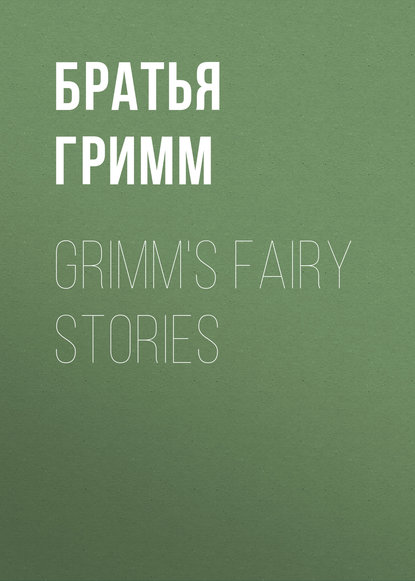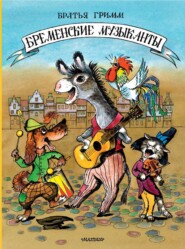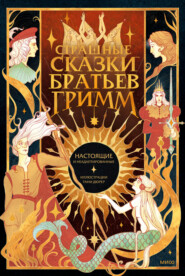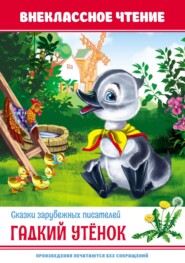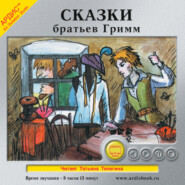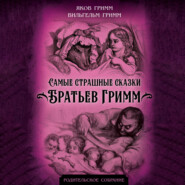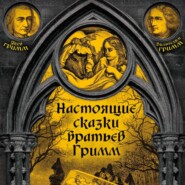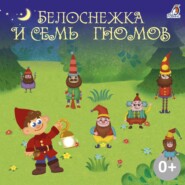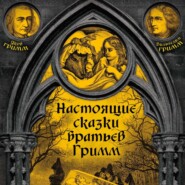По всем вопросам обращайтесь на: info@litportal.ru
(©) 2003-2024.
✖
Grimm's Fairy Stories
Настройки чтения
Размер шрифта
Высота строк
Поля
"Blow, breezes, blow!
Let Curdken's hat go!
Blow breezes, blow!
Let him after it go!
O'er hills, dales, and rocks,
Away be it whirl'd,
Till the golden locks
Are all comb'd and curl'd!"
And soon came a gale of wind, and carried away Curdken's hat, while the girl went on combing and curling her hair.
All this the old king saw; so he went home without being seen; and when the goose-girl came back in the evening, he called her aside, and asked her why she did so; but she burst into tears, and said, "That I must not tell you or any man, or I shall lose my life."
But the old king begged so hard that she had no peace till she had told him all, word for word: and it was very lucky for her that she did so, for the king ordered royal clothes to be put upon her, and he gazed with wonder, she was so beautiful.
Then he called his son, and told him that he had only the false bride, for that she was merely a waiting-maid, while the true one stood by.
And the young king rejoiced when he saw her beauty, and heard how meek and patient she had been; and without saying anything, he ordered a great feast to be prepared for all his court.
The bridegroom sat at the top, with the false princess on one side, and the true one on the other; but nobody knew her, for she was quite dazzling to their eyes, and was not at all like the little goose-girl, now that she had on her brilliant dress.
When they had eaten and drunk, and were very merry, the old king told all the story, as one that he had once heard of, and asked the true waiting-maid what she thought ought to be done to anyone who would behave thus.
"Nothing better," said this false bride, "than that she should be thrown into a cask stuck around with sharp nails, and that two white horses should be put to it, and should drag it from street to street till she is dead."
"Thou art she!" said the old king; "and since thou hast judged thyself, it shall be so done to thee."
Then the young king was married to his true wife, and they reigned over the kingdom in peace and happiness all their lives.
THE LITTLE BROTHER AND SISTER
There was once a little brother who took his Sister by the hand, and said, "Since our own dear mother's death we have not had one happy hour; our stepmother beats us every day, and, when we come near her, kicks us away with her foot. Come, let us wander forth into the wide world." So all day long they travelled over meadows, fields, and stony roads. By the evening they came into a large forest, and laid themselves down in a hollow tree, and went to sleep. When they awoke the next morning, the sun had already risen high in the heavens, and its beams made the tree so hot that the little boy said to his sister, "I am so very thirsty, that if I knew where there was a brook, I would go and drink. Ah! I think I hear one running;" and so saying, he got up, and taking his Sister's hand they went to look for the brook.
The wicked stepmother, however, was a witch, and had witnessed the departure of the two children: so, sneaking after them secretly, as is the habit of witches, she had enchanted all the springs in the forest.
Presently they found a brook, which ran trippingly over the pebbles, and the Brother would have drunk out of it, but the Sister heard how it said as it ran along, "Who drinks of me will become a tiger!" So the Sister exclaimed, "I pray you, Brother, drink not, or you will become a tiger, and tear me to pieces!" So the Brother did not drink, although his thirst was very great, and he said, "I will wait till the next brook." As they came to the second, the Sister heard it say, "Who drinks of me becomes a wolf!" The Sister ran up crying, "Brother, do not, pray do not drink, or you will become a wolf and eat me up!" Then the Brother did not drink, saying, "I will wait until we come to the next spring, but then I must drink, you may say what you will; my thirst is much too great." Just as they reached the third brook, the Sister heard the voice saying, "Who drinks of me will become a fawn – who drinks of me will become a fawn!" So the Sister said, "Oh, my Brother do not drink, or you will be changed into a fawn, and run away from me!" But he had already kneeled down, and he drank of the water, and, as the first drops passed his lips, his shape took that of a fawn.
At first the Sister wept over her little, changed Brother, and he wept too, and knelt by her, very sorrowful; but at last the maiden said, "Be still, dear little fawn, and I will never forsake you!" and, taking off her golden garter, she placed it around his neck, and, weaving rushes, made a girdle to lead him with. This she tied to him, and taking the other end in her hand, she led him away, and they travelled deeper and deeper into the forest. After they had gone a long distance they came to a little hut, and the maiden, peeping in, found it empty, and thought, "Here we can stay and dwell." Then she looked for leaves and moss to make a soft couch for the Fawn, and every morning she went out and collected roots and berries and nuts for herself, and tender grass for the Fawn. In the evening when the Sister was tired, and had said her prayers, she laid her head upon the back of the Fawn, which served for a pillow, on which she slept soundly. Had but the Brother regained his own proper form, their lives would have been happy indeed.
Thus they dwelt in this wilderness, and some time had elapsed when it happened that the King of the country had a great hunt in the forest; and now sounded through the trees the blowing of horns, the barking of dogs, and the lusty cry of the hunters, so that the little Fawn heard them, and wanted very much to join in. "Ah!" said he to his Sister, "let me go to the hunt, I cannot restrain myself any longer;" and he begged so hard that at last she consented. "But," she told him," "return again in the evening, for I shall shut my door against the wild huntsmen, and, that I may know you, do you knock, and say, 'Sister, dear, let me in,' and if you do not speak I shall not open the door."
As soon as she had said this, the little Fawn sprang off quite glad and merry in the fresh breeze. The King and his huntsmen perceived the beautiful animal, and pursued him; but they could not catch him, and when they thought they certainly had him, he sprang away over the bushes, and got out of sight. Just as it was getting dark, he ran up to the hut, and, knocking, said, "Sister mine, let me in." Then she unfastened the little door, and he went in, and rested all night long upon his soft couch. The next morning the hunt was commenced again, and as soon as the little Fawn heard the horns and the tally-ho of the sportsmen he could not rest, and said, "Sister, dear, open the door; I must be off." The Sister opened it, saying, "Return at evening, mind, and say the words as before." When the King and his huntsmen saw him again, the Fawn with the golden necklace, they followed him, close, but he was too nimble and quick for them. The whole day long they kept up with him, but towards evening the huntsmen made a circle around him, and one wounded him slightly in the hinder foot, so that he could run but slowly. Then one of them slipped after him to the little hut, and heard him say, "Sister, dear, open the door," and saw that the door was opened and immediately shut behind him. The huntsman, having observed all this, went and told the King what he had seen and heard, and he said, "On the morrow I will pursue him once again."
The Sister, however, was terribly afraid when she saw that her Fawn was wounded, and, washing off the blood, she put herbs upon the foot, and said, "Go and rest upon your bed, dear Fawn, that your wound may heal." It was so slight, that the next morning he felt nothing of it, and when he heard the hunting cries outside, he exclaimed, "I cannot stop away – I must be there, and none shall catch me so easily again!" The Sister wept very much and told him, "Soon will they kill you, and I shall be here alone in this forest, forsaken by all the world: I cannot let you go."
"I shall die here in vexation," answered the Fawn, "if you do not, for when I hear the horn, I think I shall jump out of my skin." The Sister, finding she could not prevent him, opened the door, with a heavy heart, and the Fawn jumped out, quite delighted, into the forest. As soon as the King perceived him, he said to his huntsmen, "Follow him all day long till the evening, but let no one do him any harm." Then when the sun had set, the King asked his huntsman to show him the hut; and as they came to it he knocked at the door and said, "Let me in, dear Sister." Upon this the door opened, and, stepping in, the King saw a maiden more beautiful than he had ever beheld before. She was frightened when she saw not her Fawn, but a man enter, who had a golden crown upon his head. But the King, looking at her with a kindly glance, held out to her his hand, saying, "Will you go with me to my castle, and be my dear wife?" "Oh, yes," replied the maiden; "but the Fawn must go too: him I will never forsake." The King replied, "He shall remain with you as long as you live, and shall never want."
The King took the beautiful maiden upon his horse, and rode to his castle, where the wedding was celebrated with great splendor and she became Queen, and they lived together a long time; while the Fawn was taken care of and played about the castle garden.
The wicked stepmother, however, on whose account the children had wandered forth into the world, had supposed that long ago the Sister had been torn into pieces by the wild beasts, and the little Brother in his Fawn's shape hunted to death by the hunters. As soon, therefore, as she heard how happy they had become, and how everything prospered with them, envy and jealousy were aroused in her wicked heart, and left her no peace; and she was always thinking in what way she could bring misfortune upon them.
Her own daughter, who was as ugly as night, and had but one eye, for which she was continually reproached, said, "The luck of being a Queen has never happened to me." "Be quiet, now," replied the old woman, "and make yourself contented: when the time comes I will help and assist you." As soon, then, as the time came when the Queen gave birth to a beautiful little boy, which happened when the King was out hunting, the old witch took the form of a chambermaid, and got into the room where the Queen was lying, and said to her, "The bath is ready, which will restore you and give you fresh strength; be quick before it gets cold." Her daughter being at hand, they carried the weak Queen between them into the room, and laid her in the bath, and then, shutting the door, they ran off; but first they made up an immense fire in the stove, which must soon suffocate the poor young Queen.
When this was done, the old woman took her daughter, and, putting a cap upon her head, laid her in the bed in the Queen's place. She gave her, too, the form and appearance of the real Queen, as far as she was able; but she could not restore the lost eye, and, so that the King might not notice it, she turned her upon that side where there was no eye.
When midnight came, and every one was asleep, the nurse, who sat by herself, wide awake, near the cradle, in the nursery, saw the door open and the true Queen come in. She took the child in her arms, and rocked it a while, and then, shaking up its pillow, laid it down in its cradle, and covered it over again. She did not forget the Fawn, either, but going to the corner where he was, stroked his head, and then went silently out of the door. The nurse asked in the morning of the guards if any one had passed into the castle during the night; but they answered, "No, we have not seen anybody." For many nights afterwards she came constantly, but never spoke a word; and the nurse saw her always, but she would not trust herself to speak about it to any one.
When some time had passed away, the Queen one night began to speak, and said —
"How fares my child! how fares my fawn?
Twice more will I come, but never again."
The nurse made no reply; but, when she had disappeared, went to the King, and told him. The King exclaimed, "Oh, mercy! what does this mean? – the next night I will watch myself by the child." So in the evening he went into the nursery, and about midnight the Queen appeared, and said —
"How fares my child! how fares my fawn?
Once more will I come, but never again."
And she nursed the child, as she usually did, and then disappeared. The King dared not speak; but he watched the following night, and this time she said —
"How fares my child! how fares my fawn?
This time have I come, but never again."
At these words the King could hold back no longer, but, springing up, cried, "You can be no other than my dear wife!" Then she answered, "Yes, I am your dear wife;" and at that moment her life was restored by God's mercy, and she was again as beautiful and charming as ever. She told the King the fraud which the witch and her daughter had practised upon him, and he had them both tried, and sentence was pronounced against them. The little Fawn was disenchanted, and received once more his human form; and the Brother and Sister lived happily together to the end of their days.
HANSEL AND GRETHEL
Once upon a time there dwelt near a large wood a poor woodcutter, with his wife and two children by his former marriage, a little boy called Hansel, and a girl named Grethel. He had little enough to break or bite; and once, when there was a great famine in the land, he could not procure even his daily bread; and as he lay thinking in his bed one evening, rolling about for trouble, he sighed, and said to his wife, "What will become of us? How can we feed our children, when we have no more than we can eat ourselves?"
"Know, then, my husband," answered she, "we will lead them away, quite early in the morning, into the thickest part of the wood, and there make them a fire, and give them each a little piece of bread; then we will go to our work, and leave them alone, so they will not find the way home again, and we shall be freed from them." "No, wife," replied he, "that I can never do. How can you bring your heart to leave my children all alone in the wood, for the wild beasts will soon come and tear them to pieces?"
"Oh, you simpleton!" said she, "then we must all four die of hunger; you had better plane the coffins for us." But she left him no peace till he consented, saying, "Ah, but I shall regret the poor children."
The two children, however, had not gone to sleep for very hunger, and so they overheard what the stepmother said to their father. Grethel wept bitterly, and said to Hansel, "What will become of us?" "Be quiet, Grethel," said he; "do not cry – I will soon help you." And as soon as their parents had fallen asleep, he got up, put on his coat, and, unbarring the back door, slipped out. The moon shone brilliantly, and the white pebbles which lay before the door seemed like silver pieces, they glittered so brightly. Hansel stooped down, and put as many into his pocket as it would hold; and then going back, he said to Grethel, "Be comforted, dear sister, and sleep in peace; God will not forsake us." And so saying, he went to bed again.
The next morning, before the sun arose, the wife went and awoke the two children. "Get up, you lazy things; we are going into the forest to chop wood." Then she gave them each a piece of bread, saying, "There is something for your dinner; do not eat it before the time, for you will get nothing else." Grethel took the bread in her apron, for Hansel's pocket was full of pebbles; and so they all set out upon their way. When they had gone a little distance, Hansel stood still, and peeped back at the house; and this he repeated several times, till his father said, "Hansel, what are you peeping at, and why do you lag behind? Take care, and remember your legs."
"Ah, father," said Hansel, "I am looking at my white cat sitting upon the roof of the house, and trying to say good-bye." "You simpleton!" said the wife, "that is not a cat; it is only the sun shining on the white chimney." But in reality Hansel was not looking at a cat; but every time he stopped, he dropped a pebble out of his pocket upon the path.
When they came to the middle of the forest, the father told the children to collect wood, and he would make them a fire, so that they should not be cold. So Hansel and Grethel gathered together quite a little mountain of twigs. Then they set fire to them; and as the flame burnt up high, the wife said, "Now, you children, lie down near the fire, and rest yourselves, while we go into the forest and chop wood; when we are ready, I will come and call you."
Hansel and Grethel sat down by the fire, and when it was noon, each ate the piece of bread; and because they could hear the blows of an axe, they thought their father was near: but it was not an axe, but a branch which he had bound to a withered tree, so as to be blown to and fro by the wind. They waited so long that at last their eyes closed from weariness, and they fell fast asleep. When they awoke, it was quite dark, and Grethel began to cry, "How shall we get out of the wood?" But Hansel tried to comfort her by saying, "Wait a little while till the moon rises, and then we will quickly find the way." The moon soon shone forth, and Hansel, taking his sister's hand, followed the pebbles, which glittered like new-coined silver pieces, and showed them the path. All night long they walked on, and as day broke they came to their father's house. They knocked at the door, and when the wife opened it, and saw Hansel and Grethel, she exclaimed, "You wicked children! why did you sleep so long in the wood? We thought you were never coming home again." But their father was very glad, for it had grieved his heart to leave them all alone.
Not long afterward there was again great scarcity in every corner of the land; and one night the children overheard their stepmother saying to their father, "Everything is again consumed; we have only half a loaf left, and then the song is ended: the children must be sent away. We will take them deeper into the wood, so that they may not find the way out again; it is the only means of escape for us."
But her husband felt heavy at heart, and thought, "It were better to share the last crust with the children." His wife, however, would listen to nothing that he said, and scolded and reproached him without end.
He who says A must say B too; and he who consents the first time must also the second.
The children, however, had heard the conversation as they lay awake, and as soon as the old people went to sleep Hansel got up, intending to pick up some pebbles as before; but the wife had locked the door, so that he could not get out. Nevertheless, he comforted Grethel, saying, "Do not cry; sleep in quiet; the good God will not forsake us."
Let Curdken's hat go!
Blow breezes, blow!
Let him after it go!
O'er hills, dales, and rocks,
Away be it whirl'd,
Till the golden locks
Are all comb'd and curl'd!"
And soon came a gale of wind, and carried away Curdken's hat, while the girl went on combing and curling her hair.
All this the old king saw; so he went home without being seen; and when the goose-girl came back in the evening, he called her aside, and asked her why she did so; but she burst into tears, and said, "That I must not tell you or any man, or I shall lose my life."
But the old king begged so hard that she had no peace till she had told him all, word for word: and it was very lucky for her that she did so, for the king ordered royal clothes to be put upon her, and he gazed with wonder, she was so beautiful.
Then he called his son, and told him that he had only the false bride, for that she was merely a waiting-maid, while the true one stood by.
And the young king rejoiced when he saw her beauty, and heard how meek and patient she had been; and without saying anything, he ordered a great feast to be prepared for all his court.
The bridegroom sat at the top, with the false princess on one side, and the true one on the other; but nobody knew her, for she was quite dazzling to their eyes, and was not at all like the little goose-girl, now that she had on her brilliant dress.
When they had eaten and drunk, and were very merry, the old king told all the story, as one that he had once heard of, and asked the true waiting-maid what she thought ought to be done to anyone who would behave thus.
"Nothing better," said this false bride, "than that she should be thrown into a cask stuck around with sharp nails, and that two white horses should be put to it, and should drag it from street to street till she is dead."
"Thou art she!" said the old king; "and since thou hast judged thyself, it shall be so done to thee."
Then the young king was married to his true wife, and they reigned over the kingdom in peace and happiness all their lives.
THE LITTLE BROTHER AND SISTER
There was once a little brother who took his Sister by the hand, and said, "Since our own dear mother's death we have not had one happy hour; our stepmother beats us every day, and, when we come near her, kicks us away with her foot. Come, let us wander forth into the wide world." So all day long they travelled over meadows, fields, and stony roads. By the evening they came into a large forest, and laid themselves down in a hollow tree, and went to sleep. When they awoke the next morning, the sun had already risen high in the heavens, and its beams made the tree so hot that the little boy said to his sister, "I am so very thirsty, that if I knew where there was a brook, I would go and drink. Ah! I think I hear one running;" and so saying, he got up, and taking his Sister's hand they went to look for the brook.
The wicked stepmother, however, was a witch, and had witnessed the departure of the two children: so, sneaking after them secretly, as is the habit of witches, she had enchanted all the springs in the forest.
Presently they found a brook, which ran trippingly over the pebbles, and the Brother would have drunk out of it, but the Sister heard how it said as it ran along, "Who drinks of me will become a tiger!" So the Sister exclaimed, "I pray you, Brother, drink not, or you will become a tiger, and tear me to pieces!" So the Brother did not drink, although his thirst was very great, and he said, "I will wait till the next brook." As they came to the second, the Sister heard it say, "Who drinks of me becomes a wolf!" The Sister ran up crying, "Brother, do not, pray do not drink, or you will become a wolf and eat me up!" Then the Brother did not drink, saying, "I will wait until we come to the next spring, but then I must drink, you may say what you will; my thirst is much too great." Just as they reached the third brook, the Sister heard the voice saying, "Who drinks of me will become a fawn – who drinks of me will become a fawn!" So the Sister said, "Oh, my Brother do not drink, or you will be changed into a fawn, and run away from me!" But he had already kneeled down, and he drank of the water, and, as the first drops passed his lips, his shape took that of a fawn.
At first the Sister wept over her little, changed Brother, and he wept too, and knelt by her, very sorrowful; but at last the maiden said, "Be still, dear little fawn, and I will never forsake you!" and, taking off her golden garter, she placed it around his neck, and, weaving rushes, made a girdle to lead him with. This she tied to him, and taking the other end in her hand, she led him away, and they travelled deeper and deeper into the forest. After they had gone a long distance they came to a little hut, and the maiden, peeping in, found it empty, and thought, "Here we can stay and dwell." Then she looked for leaves and moss to make a soft couch for the Fawn, and every morning she went out and collected roots and berries and nuts for herself, and tender grass for the Fawn. In the evening when the Sister was tired, and had said her prayers, she laid her head upon the back of the Fawn, which served for a pillow, on which she slept soundly. Had but the Brother regained his own proper form, their lives would have been happy indeed.
Thus they dwelt in this wilderness, and some time had elapsed when it happened that the King of the country had a great hunt in the forest; and now sounded through the trees the blowing of horns, the barking of dogs, and the lusty cry of the hunters, so that the little Fawn heard them, and wanted very much to join in. "Ah!" said he to his Sister, "let me go to the hunt, I cannot restrain myself any longer;" and he begged so hard that at last she consented. "But," she told him," "return again in the evening, for I shall shut my door against the wild huntsmen, and, that I may know you, do you knock, and say, 'Sister, dear, let me in,' and if you do not speak I shall not open the door."
As soon as she had said this, the little Fawn sprang off quite glad and merry in the fresh breeze. The King and his huntsmen perceived the beautiful animal, and pursued him; but they could not catch him, and when they thought they certainly had him, he sprang away over the bushes, and got out of sight. Just as it was getting dark, he ran up to the hut, and, knocking, said, "Sister mine, let me in." Then she unfastened the little door, and he went in, and rested all night long upon his soft couch. The next morning the hunt was commenced again, and as soon as the little Fawn heard the horns and the tally-ho of the sportsmen he could not rest, and said, "Sister, dear, open the door; I must be off." The Sister opened it, saying, "Return at evening, mind, and say the words as before." When the King and his huntsmen saw him again, the Fawn with the golden necklace, they followed him, close, but he was too nimble and quick for them. The whole day long they kept up with him, but towards evening the huntsmen made a circle around him, and one wounded him slightly in the hinder foot, so that he could run but slowly. Then one of them slipped after him to the little hut, and heard him say, "Sister, dear, open the door," and saw that the door was opened and immediately shut behind him. The huntsman, having observed all this, went and told the King what he had seen and heard, and he said, "On the morrow I will pursue him once again."
The Sister, however, was terribly afraid when she saw that her Fawn was wounded, and, washing off the blood, she put herbs upon the foot, and said, "Go and rest upon your bed, dear Fawn, that your wound may heal." It was so slight, that the next morning he felt nothing of it, and when he heard the hunting cries outside, he exclaimed, "I cannot stop away – I must be there, and none shall catch me so easily again!" The Sister wept very much and told him, "Soon will they kill you, and I shall be here alone in this forest, forsaken by all the world: I cannot let you go."
"I shall die here in vexation," answered the Fawn, "if you do not, for when I hear the horn, I think I shall jump out of my skin." The Sister, finding she could not prevent him, opened the door, with a heavy heart, and the Fawn jumped out, quite delighted, into the forest. As soon as the King perceived him, he said to his huntsmen, "Follow him all day long till the evening, but let no one do him any harm." Then when the sun had set, the King asked his huntsman to show him the hut; and as they came to it he knocked at the door and said, "Let me in, dear Sister." Upon this the door opened, and, stepping in, the King saw a maiden more beautiful than he had ever beheld before. She was frightened when she saw not her Fawn, but a man enter, who had a golden crown upon his head. But the King, looking at her with a kindly glance, held out to her his hand, saying, "Will you go with me to my castle, and be my dear wife?" "Oh, yes," replied the maiden; "but the Fawn must go too: him I will never forsake." The King replied, "He shall remain with you as long as you live, and shall never want."
The King took the beautiful maiden upon his horse, and rode to his castle, where the wedding was celebrated with great splendor and she became Queen, and they lived together a long time; while the Fawn was taken care of and played about the castle garden.
The wicked stepmother, however, on whose account the children had wandered forth into the world, had supposed that long ago the Sister had been torn into pieces by the wild beasts, and the little Brother in his Fawn's shape hunted to death by the hunters. As soon, therefore, as she heard how happy they had become, and how everything prospered with them, envy and jealousy were aroused in her wicked heart, and left her no peace; and she was always thinking in what way she could bring misfortune upon them.
Her own daughter, who was as ugly as night, and had but one eye, for which she was continually reproached, said, "The luck of being a Queen has never happened to me." "Be quiet, now," replied the old woman, "and make yourself contented: when the time comes I will help and assist you." As soon, then, as the time came when the Queen gave birth to a beautiful little boy, which happened when the King was out hunting, the old witch took the form of a chambermaid, and got into the room where the Queen was lying, and said to her, "The bath is ready, which will restore you and give you fresh strength; be quick before it gets cold." Her daughter being at hand, they carried the weak Queen between them into the room, and laid her in the bath, and then, shutting the door, they ran off; but first they made up an immense fire in the stove, which must soon suffocate the poor young Queen.
When this was done, the old woman took her daughter, and, putting a cap upon her head, laid her in the bed in the Queen's place. She gave her, too, the form and appearance of the real Queen, as far as she was able; but she could not restore the lost eye, and, so that the King might not notice it, she turned her upon that side where there was no eye.
When midnight came, and every one was asleep, the nurse, who sat by herself, wide awake, near the cradle, in the nursery, saw the door open and the true Queen come in. She took the child in her arms, and rocked it a while, and then, shaking up its pillow, laid it down in its cradle, and covered it over again. She did not forget the Fawn, either, but going to the corner where he was, stroked his head, and then went silently out of the door. The nurse asked in the morning of the guards if any one had passed into the castle during the night; but they answered, "No, we have not seen anybody." For many nights afterwards she came constantly, but never spoke a word; and the nurse saw her always, but she would not trust herself to speak about it to any one.
When some time had passed away, the Queen one night began to speak, and said —
"How fares my child! how fares my fawn?
Twice more will I come, but never again."
The nurse made no reply; but, when she had disappeared, went to the King, and told him. The King exclaimed, "Oh, mercy! what does this mean? – the next night I will watch myself by the child." So in the evening he went into the nursery, and about midnight the Queen appeared, and said —
"How fares my child! how fares my fawn?
Once more will I come, but never again."
And she nursed the child, as she usually did, and then disappeared. The King dared not speak; but he watched the following night, and this time she said —
"How fares my child! how fares my fawn?
This time have I come, but never again."
At these words the King could hold back no longer, but, springing up, cried, "You can be no other than my dear wife!" Then she answered, "Yes, I am your dear wife;" and at that moment her life was restored by God's mercy, and she was again as beautiful and charming as ever. She told the King the fraud which the witch and her daughter had practised upon him, and he had them both tried, and sentence was pronounced against them. The little Fawn was disenchanted, and received once more his human form; and the Brother and Sister lived happily together to the end of their days.
HANSEL AND GRETHEL
Once upon a time there dwelt near a large wood a poor woodcutter, with his wife and two children by his former marriage, a little boy called Hansel, and a girl named Grethel. He had little enough to break or bite; and once, when there was a great famine in the land, he could not procure even his daily bread; and as he lay thinking in his bed one evening, rolling about for trouble, he sighed, and said to his wife, "What will become of us? How can we feed our children, when we have no more than we can eat ourselves?"
"Know, then, my husband," answered she, "we will lead them away, quite early in the morning, into the thickest part of the wood, and there make them a fire, and give them each a little piece of bread; then we will go to our work, and leave them alone, so they will not find the way home again, and we shall be freed from them." "No, wife," replied he, "that I can never do. How can you bring your heart to leave my children all alone in the wood, for the wild beasts will soon come and tear them to pieces?"
"Oh, you simpleton!" said she, "then we must all four die of hunger; you had better plane the coffins for us." But she left him no peace till he consented, saying, "Ah, but I shall regret the poor children."
The two children, however, had not gone to sleep for very hunger, and so they overheard what the stepmother said to their father. Grethel wept bitterly, and said to Hansel, "What will become of us?" "Be quiet, Grethel," said he; "do not cry – I will soon help you." And as soon as their parents had fallen asleep, he got up, put on his coat, and, unbarring the back door, slipped out. The moon shone brilliantly, and the white pebbles which lay before the door seemed like silver pieces, they glittered so brightly. Hansel stooped down, and put as many into his pocket as it would hold; and then going back, he said to Grethel, "Be comforted, dear sister, and sleep in peace; God will not forsake us." And so saying, he went to bed again.
The next morning, before the sun arose, the wife went and awoke the two children. "Get up, you lazy things; we are going into the forest to chop wood." Then she gave them each a piece of bread, saying, "There is something for your dinner; do not eat it before the time, for you will get nothing else." Grethel took the bread in her apron, for Hansel's pocket was full of pebbles; and so they all set out upon their way. When they had gone a little distance, Hansel stood still, and peeped back at the house; and this he repeated several times, till his father said, "Hansel, what are you peeping at, and why do you lag behind? Take care, and remember your legs."
"Ah, father," said Hansel, "I am looking at my white cat sitting upon the roof of the house, and trying to say good-bye." "You simpleton!" said the wife, "that is not a cat; it is only the sun shining on the white chimney." But in reality Hansel was not looking at a cat; but every time he stopped, he dropped a pebble out of his pocket upon the path.
When they came to the middle of the forest, the father told the children to collect wood, and he would make them a fire, so that they should not be cold. So Hansel and Grethel gathered together quite a little mountain of twigs. Then they set fire to them; and as the flame burnt up high, the wife said, "Now, you children, lie down near the fire, and rest yourselves, while we go into the forest and chop wood; when we are ready, I will come and call you."
Hansel and Grethel sat down by the fire, and when it was noon, each ate the piece of bread; and because they could hear the blows of an axe, they thought their father was near: but it was not an axe, but a branch which he had bound to a withered tree, so as to be blown to and fro by the wind. They waited so long that at last their eyes closed from weariness, and they fell fast asleep. When they awoke, it was quite dark, and Grethel began to cry, "How shall we get out of the wood?" But Hansel tried to comfort her by saying, "Wait a little while till the moon rises, and then we will quickly find the way." The moon soon shone forth, and Hansel, taking his sister's hand, followed the pebbles, which glittered like new-coined silver pieces, and showed them the path. All night long they walked on, and as day broke they came to their father's house. They knocked at the door, and when the wife opened it, and saw Hansel and Grethel, she exclaimed, "You wicked children! why did you sleep so long in the wood? We thought you were never coming home again." But their father was very glad, for it had grieved his heart to leave them all alone.
Not long afterward there was again great scarcity in every corner of the land; and one night the children overheard their stepmother saying to their father, "Everything is again consumed; we have only half a loaf left, and then the song is ended: the children must be sent away. We will take them deeper into the wood, so that they may not find the way out again; it is the only means of escape for us."
But her husband felt heavy at heart, and thought, "It were better to share the last crust with the children." His wife, however, would listen to nothing that he said, and scolded and reproached him without end.
He who says A must say B too; and he who consents the first time must also the second.
The children, however, had heard the conversation as they lay awake, and as soon as the old people went to sleep Hansel got up, intending to pick up some pebbles as before; but the wife had locked the door, so that he could not get out. Nevertheless, he comforted Grethel, saying, "Do not cry; sleep in quiet; the good God will not forsake us."





